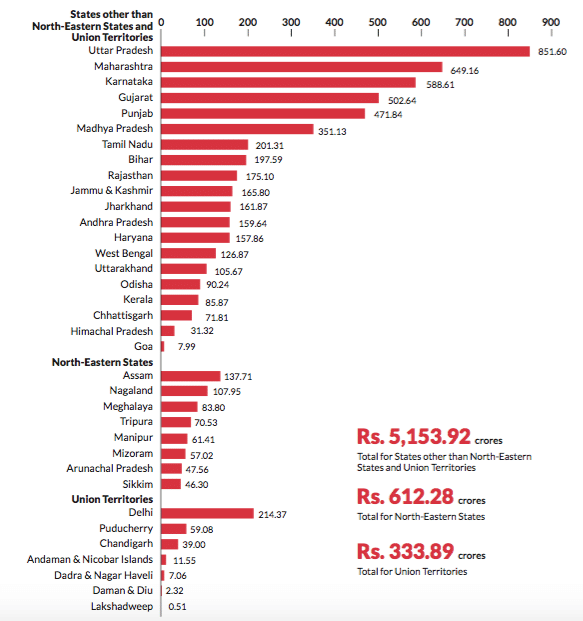The government has approved the construction of 1,023 fast track special courts for tackling the pendency in rape cases and cases under the Protection of Children from Sexual Offences (POCSO) Act 2012. For this purpose an amount of Rs 767.25 crore has been approved under the centrally sponsored scheme for development of infrastructure facilities for the judiciary for the year 2020-21.
However, given the scheme’s history of numerous inefficiencies in implementation, the question arises as to whether the Department of Justice, the central body overseeing the scheme, will draw from the lessons of the past for better outcomes this time around or not.
Misses of the past
The scheme was established in 1993 owing to the dire deficiency of courtrooms and residential buildings for judicial officers. While the scheme in its original avatar covered both the High Courts and the district courts, the latter have become the exclusive focus of the scheme since 2011. As per the design of the scheme, 60 per cent of the amount is supposed to come from the Centre while the remaining 40 per cent has to be borne by the respective state governments themselves. Since its inception, approximately Rs 7,460 crore has been allocated by the Centre to the states with uncertain outcomes. Key reasons are explained below.
Also read: Indian courts will have to prepare for a different kind of a Covid crisis
1. Disparity in fund distribution among states:
The central government’s share is supposed to be disbursed across 27 states/UTs for the fast track special courts. In fact, the Maharashtra government has reportedly sanctioned the construction of 138 fast track courts with the expected cost of Rs 100 crore. This means out of the proposed Rs 767 crore for all the states combined, it is expected that Rs 60 crore of the central share will go to Maharashtra alone, leaving, on an average, only Rs 26 crore for each of the other states.

Maharashtra has historically been the recipient of one of the highest disbursal of funds from the Centre (Rs 649 crore), second only to Uttar Pradesh (Rs 851 crore). On the other hand, states like Chhattisgarh (Rs 71.8 crore), Kerala (Rs 85.8 crore) and Odisha (Rs 90.2 crore) have received a significantly lower amount despite similar and sometimes more severe shortfall of infrastructure. (In Odisha, as per Vidhi’s study, the shortage was so extreme that if the district judiciary worked at full capacity, 50 per cent of the judges wouldn’t have courtrooms available to them. In comparison, Maharashtra and Goa combined had a shortfall of only 13 per cent courtrooms.)
Also read: Corona is a wake up call for Indian courts. They aren’t equipped to function in a crisis
2. Flawed design of the scheme:
The question that comes to fore then is why is the Centre financing the already resourceful states more generously? Clearly, there is an inherent flaw in the design of the scheme, which overlooks the actual needs of the states.
To be eligible for receiving funds from the Centre, state governments are required to submit a utilisation certificate at the end of the year for proving that the previous year’s funds have been exhausted. As this includes the state’s share of 40 per cent, states which do not have the capacity to invest large amounts of money towards judicial infrastructure may become ineligible next year. In fact, Chhattisgarh and Odisha did not receive any funds between the years 2015 and 2018.
Moreover, even if some states can allocate their respective shares, it is difficult to produce a utilisation certificate for the entire amount released within the year. If partially used, it reduces the amount released to them the following year. Any infrastructure project takes time, owing to the multiple bureaucratic levels involved. This includes getting numerous approvals, tendering the project and actual execution. Time and cost overruns are commonplace.
Yet, to satisfy the requirement under the scheme, some High Courts report that the utilisation certificate is based merely on the transfer of funds to the Public Works Department (PWD) or the relevant construction agency, irrespective of whether or not the actual construction has taken off. Worse still, the utilisation certificate, which is a standard template for all central schemes (GFR-19A), fails to accommodate adequate checks to monitor the funds and verify the information given by the states.
In conclusion it may be said that the decision of the government to build more courts under the scheme comes with the right intentions. However, unless measures are taken to address the practical difficulties of implementing the scheme, the outcomes envisaged may fall short of expectations. It is crucial that the eligibility criteria are revised and the monitoring mechanisms strengthened so that the fast track courts are up and ready to deliver justice.
Tarika Jain is a Research Fellow, Justice, Access and Lowering Delays in India (JALDI) project, Vidhi Centre for Legal Policy. Views are personal.
This article was first published by the Vidhi Centre for Legal Policy.







SUBJECT: PM, CM: Please look seriously, Easy solution, ideal punishment for (Rape Culprits, Lynching persons & Cow Vigilantes) and a humble request to CJI and his team to draft a new law without loopholes.
Respected Sir,
Today when the Rape bell rings in our cities, state and country then we try rubbing our eyes to ser through. Unfortunately, we all stand at the thresh hold of a very curtail juncture of all our lives in facing these unwanted incidents of “Rape culprits, lynching and Cow Vigilantes”. How are we all going to deal with this major problem it has become a nightmare for one and all, especially those in authorities to bring a sever punishment like never before and a lasting solution to put an end to it all. Our entire country and it’s residents especially the parents of all the relevated crimes are praying for a new law to be drafted regarding all these above stated crimes. A new law without any request entertained for unnecessarily stopping the final outcome. This new law needs to have a fast track court set up and the case closed in within a (week’s time).
But, if you genuinely want a solution to end this problem for ever then you will have to read further down. Today all the main culprits of these crimes are all free and roaming or in the jails or scot free released after a short punishment stint. This has become a pain for the families who unnecessarily suffer due to these unfortunate crimes in our cities, state and country. Now, let us get down to the solution of this crime for ever and instead put the culprit and his family in the real spot of bother. The very first thing after the crime is proved say within a day or two the rape culprit with the help of latest professional doctors to adhere them with a injection paralizing their hands and feets and simultaneously castrating the rape culprit’s penis. This will literally finish this man forever and he will never again in his life time be able to re-rape or even molest any female in the near future.
Similarly the same applies with the lynching person and cow vigilantes who too must go through this same process of his hands and legs being paralized with an injection by a professional doctor so that the person becomes a handicap for life. And all those who have encouraged them especially the political backing will start hiding from them or out of shame discard them altogether. All these culprits do not need a jail or any court to decide this action and all our jails will have ample space for the real culprits in the near future. The onus will automatically now lie with his family, colleagues or the political clout behind it.
The concern CJI, and his team of professional lawyers and judges can then breathe a sigh of relief in then dealing with such cases in the near future. Our law needs teeth to literally bite and bite to the fore, so that these crimes will be put to its final end. Our whole city, state and country especially the urban villages will benefit the most. The concerned parents who literally bear it all will feel relieved within a week’s time. PM, CM and other relevant authorities please think it over seriously and have a discussion about it in the print and electronic media. This will be a tangible solutions stated for your kind reference. It’s my humble request that taking someone’s life is not in our hands. But, punishing the culprits in a apt manner is not challenging God.
Thanking you.
I don’t understand why districts and even mandals/villages don’t use MGNREGA to construct basic infrastructure. I am sure we can use more schools, hospitals, police stations, courts. We need these urgently.